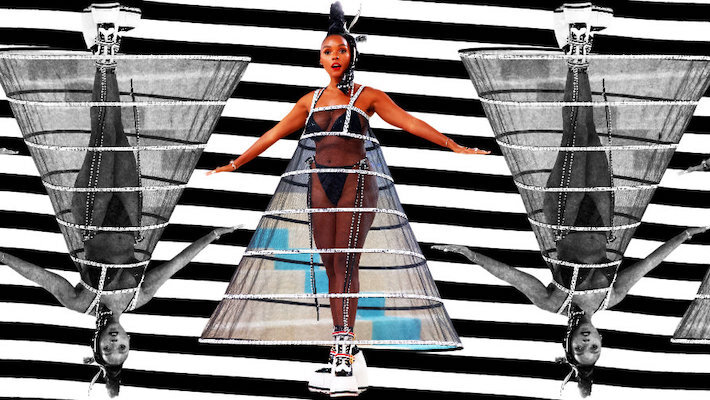What Janelle Monáe is doing isn’t new. The singer, who has long been known for their campy style and high-concept songwriting, has been turning heads ahead of the release of her fourth studio album, Age Of Pleasure, which she announced earlier this week with the video for “Lipstick Lover.” In that video — and in many of her public appearances before its release, such as at the Met Gala — Janelle makes it a point to show off aspects of theirself many fans are just seeing for the first time.
Those aspects include her physical attributes, yes — she most recently flashed a crowd during the video release party for “Lipstick Lover” — but they’ve also included her unabashed approach to sexuality. In the “Lipstick Lover” video she not only flaunts her gorgeous features, but also displays a downright impressive collection of sex toys (the use of which she “demonstrates” toward the end of the video), and what appears to be a feet kink, eating chocolate cake out of a high heeled woman’s shoe.
Fans on Twitter have been flabbergasted; the best example being the viral tweet that compared her ArchAndroid-era bichromatic suits to the Monopoly mascot, Rich Uncle Pennybags. However, those fans probably just haven’t been paying attention. Janelle Monáe has always centered her sexuality in her music. Her “titties out for the next 15 years” Twitter declaration isn’t a symbol of her sexual awakening; instead, it’s a wake-up call to the audience and a gesture of defiance at what’s been happening in the news lately.
Not to get you down or anything, but I don’t know if you’ve noticed: A lot of people are under direct attack by the political system in this country. Regressive politicians and pundits are lashing out at women, Black folks, and queer people for the past five years, in many cases with the full weight of the government behind them. These monsters are trying to legislate whole segments of the population out of existence; those they don’t want to wipe out, they definitely want to see singing “Swing Low, Sweet Chariot” in the cotton fields again.
And with the next election cycle a year away and the legal options looking bleak, there’s been little recourse for those targeted but to get a little louder every day — a little less abashed, a little more aggressive, and a lot more visible, in spite of the hatred radiating their way from nearly every side. The only real way to fight propaganda is with information. So, if Fox News wants to paint trans and queer people as a threat to the American way of life, then those people’s weapon to fight back is to show America they’re just folks like the rest of us.
The same goes for Black people. If state representatives are going to rally against “wokeness” — a dogwhistle for Black people just showing up and refusing to assimilate to whiteness — then the antidote is more representation, not less. And women, whose sexual health is being restricted by the so-called “small government” party, must indulge their desires as much as they can while they still can. If so-called “conservatives” are so threatened by women’s sexual freedom, then women owe it to themselves to enjoy menacing those concern trolls right out of existence.
Janelle Monáe has been doing these things her whole career. If fans are just catching on, it’s their own fault for just scratching the surface and not engaging because of her androgynous, early-career style. Their politics have always been right there in the music, even if they were veiled by the grand metaphor of her “Cindi Mayweather/Electric Lady/ArchAndroid” persona and storytelling. The whole point of Cindi Mayweather as a messianic figure is that she defies the oppressive oligarchy that wishes to suppress freedom and love with the power of time travel. Sound familiar?
Even on her most recent album, 2018’s Dirty Computer, she made clear references to her sexuality and her pleasure in defiance of the autocratic regime. “Pynk” was a song specifically about pussy power, while “Django Jane” evokes Quentin Tarantino’s antebellum revenge film as Monáe declares feminine supremacy. “Remember when they used to say I look too mannish / Black girl magic, y’all can’t stand it / Y’all can’t ban it, made out like a bandit / They been tryin’ hard just to make us all vanish / I suggest they put a flag on a whole ‘nother planet.”
And yes, in this time, she was already beginning to shed the guise of the Android — a guise fans disrespect a little too much with flippant jokes about her dressing like Fonzworth Bentley. She dressed this way to honor her blue-collar family; in her mind, the black-and-white was a uniform that celebrated their uniforms as they went to work cleaning homes and delivering mail. Even then, she was telling us who she was; it’s not a reach to see the bichromatic outfits reflecting her bisexuality and non-binary status.
But now, she doesn’t get to have the luxury of metaphors or double entendres. The situation has become more dire than ever. So now, she’s taken off the pretexts as well as the clothing. She’s still presenting herself as the martyr and messiah, fighting back by being louder, bolder, and brighter than the hatred and those who’d rather see her silent and diminished. That’s not new either. It’s the story of America, of being Black, of being queer, of being non-binary, and always fighting to be seen, to be heard, and to not just survive in a hostile world but thrive.
Source link

